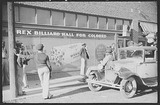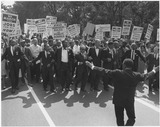
Describe how major sociological perspectives view race and ethnicityIdentify examples of culture of prejudice
- Subject:
- Social Science
- Sociology
- Material Type:
- Module
- Author:
- OpenStax College
- Date Added:
- 07/18/2021

Describe how major sociological perspectives view race and ethnicityIdentify examples of culture of prejudice



Give examples of religion as an agent of social changeDescribe current U.S. trends including megachurches and secularization

Discuss the historical view of religion from a sociological perspectiveUnderstand how the major sociological paradigms view religion

Explain the differences between various types of religious organizationsUnderstand classifications of religion, like animism, polytheism, monotheism, and atheismDescribe several major world religions


Describe different forms of collective behaviorDifferentiate between types of crowdsDiscuss emergent norm, value-added, and assembling perspective analyses of collective behavior


Explain how technology, social institutions, population, and the environment can bring about social changeDiscuss the importance of modernization in relation to social change

Demonstrate awareness of social movements on a state, national, and global levelDistinguish between different types of social movementsIdentify stages of social movementsDiscuss theoretical perspectives on social movements, like resource mobilization, framing, and new social movement theory


Define global stratificationDescribe different sociological models for understanding global stratificationUnderstand how studies of global stratification identify worldwide inequalities


Understand the U.S. class structureDescribe several types of social mobilityRecognize characteristics that define and identify class

Understand and apply functionalist, conflict theory, and interactionist perspectives on social stratification

Differentiate between open and closed stratification systemsDistinguish between caste and class systemsUnderstand meritocracy as an ideal system of stratification


Learn the roles of families and peer groups in socializationUnderstand how we are socialized through formal institutions like schools, workplaces, and the government
